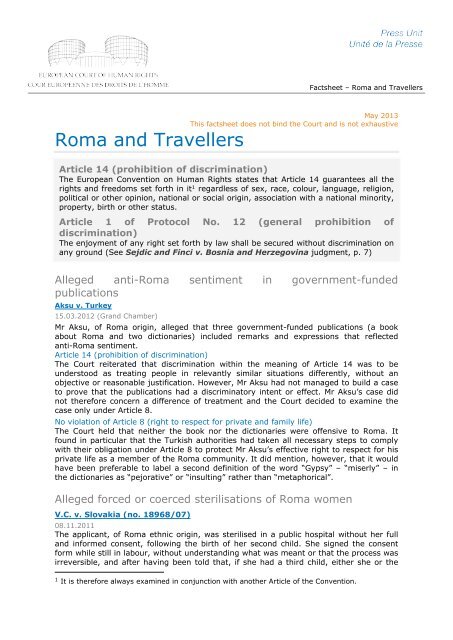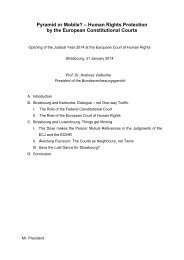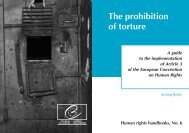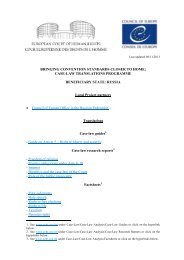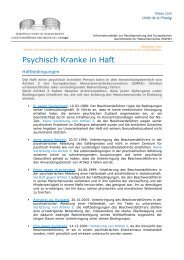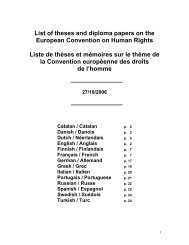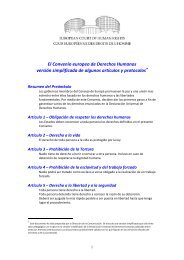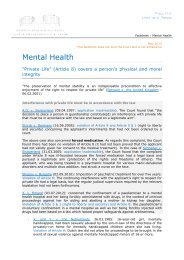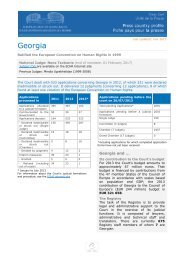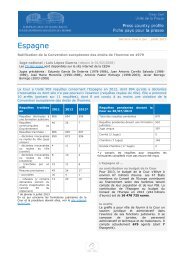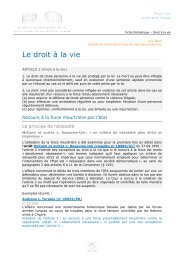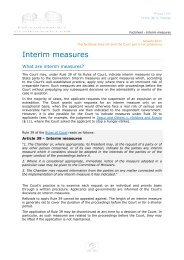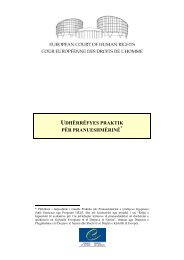Factsheet Roma and Travellers - European Court of Human Rights
Factsheet Roma and Travellers - European Court of Human Rights
Factsheet Roma and Travellers - European Court of Human Rights
Create successful ePaper yourself
Turn your PDF publications into a flip-book with our unique Google optimized e-Paper software.
<strong>Factsheet</strong> – <strong>Roma</strong> <strong>and</strong> <strong>Travellers</strong><br />
May 2013<br />
This factsheet does not bind the <strong>Court</strong> <strong>and</strong> is not exhaustive<br />
<strong>Roma</strong> <strong>and</strong> <strong>Travellers</strong><br />
Article 14 (prohibition <strong>of</strong> discrimination)<br />
The <strong>European</strong> Convention on <strong>Human</strong> <strong>Rights</strong> states that Article 14 guarantees all the<br />
rights <strong>and</strong> freedoms set forth in it 1 regardless <strong>of</strong> sex, race, colour, language, religion,<br />
political or other opinion, national or social origin, association with a national minority,<br />
property, birth or other status.<br />
Article 1 <strong>of</strong> Protocol No. 12 (general prohibition <strong>of</strong><br />
discrimination)<br />
The enjoyment <strong>of</strong> any right set forth by law shall be secured without discrimination on<br />
any ground (See Sejdic <strong>and</strong> Finci v. Bosnia <strong>and</strong> Herzegovina judgment, p. 7)<br />
Alleged anti-<strong>Roma</strong> sentiment in government-funded<br />
publications<br />
Aksu v. Turkey<br />
15.03.2012 (Gr<strong>and</strong> Chamber)<br />
Mr Aksu, <strong>of</strong> <strong>Roma</strong> origin, alleged that three government-funded publications (a book<br />
about <strong>Roma</strong> <strong>and</strong> two dictionaries) included remarks <strong>and</strong> expressions that reflected<br />
anti-<strong>Roma</strong> sentiment.<br />
Article 14 (prohibition <strong>of</strong> discrimination)<br />
The <strong>Court</strong> reiterated that discrimination within the meaning <strong>of</strong> Article 14 was to be<br />
understood as treating people in relevantly similar situations differently, without an<br />
objective or reasonable justification. However, Mr Aksu had not managed to build a case<br />
to prove that the publications had a discriminatory intent or effect. Mr Aksu’s case did<br />
not therefore concern a difference <strong>of</strong> treatment <strong>and</strong> the <strong>Court</strong> decided to examine the<br />
case only under Article 8.<br />
No violation <strong>of</strong> Article 8 (right to respect for private <strong>and</strong> family life)<br />
The <strong>Court</strong> held that neither the book nor the dictionaries were <strong>of</strong>fensive to <strong>Roma</strong>. It<br />
found in particular that the Turkish authorities had taken all necessary steps to comply<br />
with their obligation under Article 8 to protect Mr Aksu’s effective right to respect for his<br />
private life as a member <strong>of</strong> the <strong>Roma</strong> community. It did mention, however, that it would<br />
have been preferable to label a second definition <strong>of</strong> the word “Gypsy” – “miserly” – in<br />
the dictionaries as “pejorative” or “insulting” rather than “metaphorical”.<br />
Alleged forced or coerced sterilisations <strong>of</strong> <strong>Roma</strong> women<br />
V.C. v. Slovakia (no. 18968/07)<br />
08.11.2011<br />
The applicant, <strong>of</strong> <strong>Roma</strong> ethnic origin, was sterilised in a public hospital without her full<br />
<strong>and</strong> informed consent, following the birth <strong>of</strong> her second child. She signed the consent<br />
form while still in labour, without underst<strong>and</strong>ing what was meant or that the process was<br />
irreversible, <strong>and</strong> after having been told that, if she had a third child, either she or the<br />
1 It is therefore always examined in conjunction with another Article <strong>of</strong> the Convention.
<strong>Factsheet</strong> – <strong>Roma</strong> <strong>and</strong> <strong>Travellers</strong><br />
baby would die. She has since been ostracised by the <strong>Roma</strong> community <strong>and</strong>, now<br />
divorced, cites her infertility as one <strong>of</strong> the reasons for her separation from her<br />
ex-husb<strong>and</strong>.<br />
Violation <strong>of</strong> Article 3 (prohibition <strong>of</strong> inhuman or degrading treatment)<br />
No violation <strong>of</strong> Article 3 (lack <strong>of</strong> an effective investigation)<br />
Violation <strong>of</strong> 8 (right to respect for private <strong>and</strong> family life)<br />
The <strong>Court</strong> found that V.C. must have experienced fear, anguish <strong>and</strong> feelings <strong>of</strong> inferiority<br />
as a result <strong>of</strong> her sterilisation, as well as the way in which she had been requested to<br />
agree to it. She had suffered physically <strong>and</strong> psychologically over a long period <strong>and</strong> also<br />
in terms <strong>of</strong> her relationship with her then husb<strong>and</strong> <strong>and</strong> the <strong>Roma</strong> community. Although<br />
there was no pro<strong>of</strong> that the medical staff concerned had intended to ill-treat her, they<br />
had acted with gross disregard to her right to autonomy <strong>and</strong> choice as a patient. Her<br />
sterilisation had therefore been in violation <strong>of</strong> Article 3. There had also been a violation<br />
<strong>of</strong> Article 8 concerning the lack <strong>of</strong> legal safeguards giving special consideration to her<br />
reproductive health as a <strong>Roma</strong> at that time. New legislation (the Health Care Act 2004)<br />
has now been introduced, which stipulates that sterilisation can only take place 30 days<br />
after a written request has been received. It also requires the provision <strong>of</strong> prior<br />
information about alternative methods <strong>of</strong> contraception, planned parenthood <strong>and</strong> the<br />
medical consequences.<br />
Similar cases:<br />
N.B. v. Slovakia (no. 29518/10)<br />
12.06.2012<br />
Concerned the applicant’s allegation that she had been sterilised without her full <strong>and</strong><br />
informed consent in a public hospital in Slovakia.<br />
Violation <strong>of</strong> Article 3 (prohibition <strong>of</strong> inhuman or degrading treatment)<br />
No violation <strong>of</strong> Article 3 (lack <strong>of</strong> an effective investigation)<br />
Violation <strong>of</strong> Article 8 (right to respect for private <strong>and</strong> family life)<br />
I.G., M.K. <strong>and</strong> R.H. v. Slovakia (no. 15966/04)<br />
13.11.2012<br />
Concerned three women <strong>of</strong> <strong>Roma</strong> origin who complained in particular that they had been<br />
sterilised without their full <strong>and</strong> informed consent, that the authorities’ ensuing<br />
investigation into their sterilisation had not been thorough, fair or effective <strong>and</strong> that their<br />
ethnic origin had played a decisive role in their sterilisation.<br />
Violation <strong>of</strong> Article 3 (treatment) – on account <strong>of</strong> the first <strong>and</strong> second applicants’<br />
sterilisation<br />
Violation <strong>of</strong> Article 3 (investigation) – in respect <strong>of</strong> the first <strong>and</strong> second applicants<br />
Violation <strong>of</strong> Article 8 (right to respect for private <strong>and</strong> family life) – in respect <strong>of</strong> the first<br />
<strong>and</strong> second applicants<br />
No violation <strong>of</strong> Article 13 (right to an effective remedy)<br />
As regards the third applicant, the <strong>Court</strong> decided to strike the application out <strong>of</strong> its list <strong>of</strong><br />
cases, under Article 37 § 1 (c) <strong>of</strong> the Convention<br />
Obligation <strong>of</strong> <strong>Roma</strong> / <strong>Travellers</strong> to leave l<strong>and</strong> where they had<br />
stationed their caravans<br />
Six cases below concern applications brought by six British gypsy families complaining<br />
that they were prevented from living in caravans on their own l<strong>and</strong>.<br />
Buckley v. the United Kingdom<br />
25.09.1996<br />
The <strong>Court</strong> was satisfied that the authorities had weighed up the competing issues <strong>and</strong><br />
given relevant <strong>and</strong> sufficient reasons for their decisions, namely that the measures were<br />
taken in the enforcement <strong>of</strong> planning controls for highway safety, the preservation <strong>of</strong> the<br />
environment <strong>and</strong> public health<br />
2
<strong>Factsheet</strong> – <strong>Roma</strong> <strong>and</strong> <strong>Travellers</strong><br />
Chapman v. the United Kingdom, Coster v. the United Kingdom, Beard v. the<br />
United Kingdom, Lee v. the United Kingdom, Jane Smith v. the United Kingdom<br />
18.01.2001 (Gr<strong>and</strong> Chamber)<br />
In these five cases, the <strong>Court</strong> found that the measures taken against the applicants were<br />
“in accordance with the law” <strong>and</strong> “pursued the legitimate aim” <strong>of</strong> preservation <strong>of</strong> the<br />
environment, the l<strong>and</strong> in question being occupied without planning permission <strong>and</strong> in<br />
some cases on a Green Belt or Special L<strong>and</strong>scape area. Nor was the <strong>Court</strong> convinced<br />
that the UK (or any other <strong>of</strong> the Contracting States to the <strong>European</strong> Convention) was<br />
under an obligation to make available to the gypsy community an adequate number <strong>of</strong><br />
suitably equipped sites, Article 8 not giving a right to be provided with a home (funds<br />
enabling everyone to have a home being a political, not judicial matter)<br />
In any <strong>of</strong> the cases, no violation <strong>of</strong> Article 8 (right to respect for private <strong>and</strong> family life<br />
<strong>and</strong> home) <strong>and</strong> no violation <strong>of</strong> Article 14 (prohibition <strong>of</strong> discrimination) <strong>of</strong> the Convention<br />
Connors v. the UK<br />
27.05.2004<br />
Eviction <strong>of</strong> applicant <strong>and</strong> his family from the local authority’s gypsy site at Cottingley<br />
Springs in Leeds (Engl<strong>and</strong>), where they had lived permanently for about 13 years, on the<br />
ground that they had misbehaved <strong>and</strong> caused considerable nuisance at the site. The<br />
<strong>Court</strong> found that the summary eviction had not been attended by the requisite<br />
procedural safeguards, namely the requirement to properly justify the serious<br />
interference with his rights<br />
Violation <strong>of</strong> Article 8 (right to respect for private <strong>and</strong> family life <strong>and</strong> home)<br />
Yordanova <strong>and</strong> Others v. Bulgaria<br />
24.04.2012<br />
The case concerned the Bulgarian authorities’ plan to evict <strong>Roma</strong> from a settlement<br />
situated on municipal l<strong>and</strong> in an area <strong>of</strong> S<strong>of</strong>ia called Batalova Vodenitsa.<br />
The <strong>Court</strong> held that there would be a violation <strong>of</strong> Article 8 (right to private <strong>and</strong> family<br />
life) if the removal order were enforced. It found in particular that the removal order had<br />
been based on a law, <strong>and</strong> reviewed under a decision-making procedure, neither <strong>of</strong> which<br />
required the authorities to balance the different interests involved.<br />
Pending case<br />
Winterstein <strong>and</strong> Others v. France (no. 27013/07)<br />
Communicated on 09.09.2008<br />
Complaint by applicants, French nationals <strong>and</strong> mostly <strong>Travellers</strong>, about their eviction<br />
from l<strong>and</strong> in Herblay (Val d’Oise in France) where they had stationed their caravans or<br />
lived in “chalets” for many years, without any alternative housing <strong>of</strong>fered to them<br />
Racially biased police investigations<br />
Nachova <strong>and</strong> Others v. Bulgaria<br />
06.07.2005 (Gr<strong>and</strong> Chamber)<br />
Duty to investigate possible racist motives in fatal police shooting <strong>of</strong> two <strong>Roma</strong> fugitives<br />
(the applicants’ relatives)<br />
Violations <strong>of</strong> Article 2 (right to life)<br />
Violation <strong>of</strong> Article 14 (prohibition <strong>of</strong> discrimination) together with Article 2 in that the<br />
authorities failed to investigate possible racist motives behind the deaths <strong>of</strong> the<br />
applicants’ relatives (but no violation <strong>of</strong> Article 14 concerning the allegation that the<br />
deaths <strong>of</strong> the applicants’ relatives constituted an act <strong>of</strong> racial violence)<br />
Similar cases:<br />
Bekos <strong>and</strong> Koutropoulos v. Greece<br />
13.12.2005<br />
3
<strong>Factsheet</strong> – <strong>Roma</strong> <strong>and</strong> <strong>Travellers</strong><br />
Secic v. Croatia<br />
31.05.2007<br />
Cobzaru v. <strong>Roma</strong>nia<br />
26.07.2007<br />
Angelova <strong>and</strong> Iliev v. Bulgaria<br />
26.07.2007<br />
Petropoulou-Tsakiris v. Greece<br />
6.12.2007<br />
Stoica v. <strong>Roma</strong>nia<br />
04.03.2008<br />
Police ill-treatment <strong>of</strong> a 14-year old during a clash between <strong>of</strong>ficials <strong>and</strong> <strong>Roma</strong> outside a<br />
bar <strong>and</strong> subsequent lack <strong>of</strong> adequate investigation. The applicant alleged that the illtreatment<br />
<strong>and</strong> decision not to prosecute the police <strong>of</strong>ficer who had beaten him were<br />
motivated by racial prejudice.<br />
Two violations <strong>of</strong> Article 3 (prohibition <strong>of</strong> inhuman or degrading treatment <strong>and</strong> lack <strong>of</strong><br />
effective investigation)<br />
Violation <strong>of</strong> Article 14 (prohibition <strong>of</strong> discrimination) on account <strong>of</strong> investigation having<br />
been racially biased<br />
Mižigárová v. Slovakia<br />
14.12.2010<br />
Death <strong>of</strong> a <strong>Roma</strong> man during a police interrogation. He was shot in the abdomen with<br />
the lieutenant’s service pistol <strong>and</strong> the investigation concluded that he had forcibly taken<br />
the gun from the lieutenant <strong>and</strong> shot himself.<br />
Violation <strong>of</strong> Article 2 (death / investigation).<br />
No violation <strong>of</strong> Article 14. The <strong>Court</strong> was not persuaded that the objective evidence was<br />
sufficiently strong in itself to suggest the existence <strong>of</strong> a racist motive for the incident.<br />
Fedorchenko <strong>and</strong> Lozenko v. Ukraine<br />
20.09.2012<br />
The applicants alleged that a police major had threatened <strong>and</strong> hit Mr Fedorchenko <strong>and</strong><br />
then set his house on fire. Relying on Article 2 (right to life) the applicants complained<br />
that five <strong>of</strong> their relatives had died in the fire <strong>and</strong> that the State authorities had failed to<br />
conduct a thorough <strong>and</strong> effective investigation into the circumstances <strong>of</strong> their death <strong>and</strong><br />
<strong>of</strong> the police major’s involvement in the arson attack. They further relied on Article 14,<br />
alleging that the crime had had racist motives due to their <strong>Roma</strong>ni ethnicity.<br />
Violation <strong>of</strong> Article 2 (investigation)<br />
No violation <strong>of</strong> Article 2 (death)<br />
Violation <strong>of</strong> Article 14 in conjunction with Article 2 (investigation)<br />
Attacks on <strong>Roma</strong> villages <strong>and</strong> destruction <strong>of</strong> property<br />
Moldovan <strong>and</strong> Others v. <strong>Roma</strong>nia (no. 2)<br />
12.07.2005<br />
In September 1993 three <strong>Roma</strong> men were attacked in the village <strong>of</strong> Hădăreni by a large<br />
crowd <strong>of</strong> non-<strong>Roma</strong> villagers, including the local police comm<strong>and</strong>er <strong>and</strong> several <strong>of</strong>ficers:<br />
one burnt to death, the other two were beaten to death by the crowd. The applicants<br />
alleged that the police then encouraged the crowd to destroy other <strong>Roma</strong> properties: in<br />
total 13 <strong>Roma</strong> houses in the village were completely destroyed. Hounded from their<br />
village <strong>and</strong> homes, the applicants were then obliged to live in crowded <strong>and</strong> unsuitable<br />
conditions – cellars, hen-houses, stables. Following criminal complaints brought by the<br />
applicants, some were awarded damages ten years later. The <strong>Court</strong> could not examine<br />
the applicants’ complaints about the destruction <strong>of</strong> their houses <strong>and</strong> possessions or their<br />
expulsion from the village, because those events took place in September 1993, before<br />
4
<strong>Factsheet</strong> – <strong>Roma</strong> <strong>and</strong> <strong>Travellers</strong><br />
the ratification <strong>of</strong> the Convention by <strong>Roma</strong>nia in June 1994. However, it found violations<br />
concerning the complaints about the applicants’ living conditions <strong>and</strong> noted that the<br />
applicants’ ethnicity had been decisive in the excessive length <strong>and</strong> result <strong>of</strong> the domestic<br />
proceedings<br />
Violations <strong>of</strong> Articles 3 (prohibition <strong>of</strong> inhuman or degrading treatment), 8 (right to<br />
respect for private <strong>and</strong> family life <strong>and</strong> home)<br />
Violation <strong>of</strong> 6 § 1 (length <strong>of</strong> proceedings)<br />
Violation <strong>of</strong> Article 14 (prohibition <strong>of</strong> discrimination) together with Article 6 § 1 <strong>and</strong><br />
Article 8<br />
Moldovan <strong>and</strong> 29 Others v. <strong>Roma</strong>nia<br />
15.02.2011 (inadmissibility decision)<br />
Case concerned difficulties with execution – general measures – <strong>of</strong> judgment Moldovan<br />
<strong>and</strong> Others v. <strong>Roma</strong>nia (no. 2) <strong>of</strong> 12.07.2005<br />
Koky <strong>and</strong> Others v. Slovakia<br />
12.06.2012<br />
Concerned an allegedly racially motivated assault by private individuals against a group<br />
<strong>of</strong> people <strong>of</strong> <strong>Roma</strong> origin in a village in Slovakia.<br />
Violation <strong>of</strong> Article 3 (prohibition <strong>of</strong> inhuman or degrading treatment – lack <strong>of</strong> an<br />
effective investigation)<br />
The <strong>Court</strong> held that the authorities had not done everything that could have been<br />
expected to investigate the incident, in particular taking into account its racial overtones.<br />
Similar cases:<br />
Gergely v. <strong>Roma</strong>nia <strong>and</strong> Kalanyos <strong>and</strong> Others v. <strong>Roma</strong>nia<br />
26.04.2007<br />
Tanase <strong>and</strong> Others v. <strong>Roma</strong>nia<br />
26.05.2009<br />
Struck out following declaration by <strong>Roma</strong>nian Government in which it recognised<br />
violations <strong>of</strong> Articles 3, 6, 8, 13 <strong>and</strong> 14 <strong>and</strong> <strong>of</strong> Article 1 <strong>of</strong> Protocol No. 1 (protection <strong>of</strong><br />
property) <strong>and</strong> undertook to pay compensation to all applicants for the loss <strong>of</strong> their<br />
property, as well as to adopt all necessary measures to ensure that their rights would be<br />
respected in the future<br />
Segregation in schools<br />
D.H. <strong>and</strong> Others v. the Czech Republic<br />
13.11.2007 (Gr<strong>and</strong> Chamber)<br />
Placement <strong>of</strong> applicants, schoolchildren <strong>of</strong> <strong>Roma</strong> origin, in “special schools” intended for<br />
pupils with learning disabilities had not been justified. In particular, the Czech legislation<br />
at the relevant time had had a disproportionately prejudicial effect on the <strong>Roma</strong><br />
community <strong>and</strong> therefore also the applicants, as members <strong>of</strong> that community<br />
Violation <strong>of</strong> Article 14 (prohibition <strong>of</strong> discrimination) together with Article 2 <strong>of</strong> Protocol No. 1 (right<br />
to education)<br />
Sampanis <strong>and</strong> Others v. Greece<br />
05.06.2008<br />
Failure to provide schooling for the applicants’ children <strong>and</strong> <strong>of</strong> their subsequent<br />
placement in special classes– in an annex to the main school building – because <strong>of</strong> their<br />
<strong>Roma</strong> origin<br />
Violation <strong>of</strong> Article 14 (prohibition <strong>of</strong> discrimination) together with Article 2 <strong>of</strong> Protocol<br />
No. 1 (right to education)<br />
5
<strong>Factsheet</strong> – <strong>Roma</strong> <strong>and</strong> <strong>Travellers</strong><br />
Orsus <strong>and</strong> Others v. Croatia<br />
16.03.2010 (Gr<strong>and</strong> Chamber)<br />
The <strong>Court</strong> found that the placement <strong>of</strong> the applicants, at times, in <strong>Roma</strong>-only classes<br />
during their primary education had not been justified, holding in particular that adequate<br />
safeguards had not been put in place at that time to ensure sufficient care for the<br />
applicants’ special needs as members <strong>of</strong> a disadvantaged <strong>and</strong> vulnerable minority<br />
Violation <strong>of</strong> Article 6 § 1 (right to a fair trial within a reasonable time) <strong>and</strong> <strong>of</strong> Article 14<br />
(prohibition <strong>of</strong> discrimination) together with Article 2 <strong>of</strong> Protocol No. 1 (right to<br />
education)<br />
Horváth és Vadászi v. Hungary<br />
09.11.2010 (decision)<br />
The case concerned the compulsory education <strong>of</strong> the applicants, who are <strong>of</strong> <strong>Roma</strong> origin,<br />
in a special class at school. They alleged that the measure applied to them was in fact<br />
one <strong>of</strong> racial segregation.<br />
Inadmissible (for non exhaustion <strong>of</strong> domestic remedies)<br />
Sampani <strong>and</strong> Others v. Greece<br />
11.12.2012<br />
The case concerned the provision <strong>of</strong> education for <strong>Roma</strong> children at the 12th Primary<br />
School in Aspropyrgos.<br />
Violation <strong>of</strong> Article 14 (prohibition <strong>of</strong> discrimination) in conjunction with Article 2 <strong>of</strong><br />
Protocol No. 1 (right to education)<br />
The <strong>Court</strong>, noting the lack <strong>of</strong> significant change since the Sampanis <strong>and</strong> Others v. Greece<br />
judgment, found that Greece had not taken into account the particular needs <strong>of</strong> the<br />
<strong>Roma</strong> children <strong>of</strong> Psari as members <strong>of</strong> a disadvantaged group <strong>and</strong> that the operation<br />
between 2008 <strong>and</strong> 2010 <strong>of</strong> the 12th Primary School in Aspropyrgos, which was attended<br />
by <strong>Roma</strong> pupils only, had amounted to discrimination against the applicants.<br />
Under Article 46 (binding force <strong>and</strong> execution <strong>of</strong> judgments), the <strong>Court</strong> recommended<br />
that those <strong>of</strong> the applicants who were still <strong>of</strong> school age be enrolled at another State<br />
school <strong>and</strong> that those who had reached the age <strong>of</strong> majority be enrolled at “second<br />
chance schools” or adult education institutes set up by the Ministry <strong>of</strong> Education under<br />
the Lifelong Learning Programme.<br />
Horváth <strong>and</strong> Kiss v. Hungary<br />
29.01.2013<br />
The case concerned the complaints <strong>of</strong> two young men <strong>of</strong> <strong>Roma</strong> origin that their<br />
education in schools for the mentally disabled had been the result <strong>of</strong> misplacement <strong>and</strong><br />
had amounted to discrimination.<br />
Violation <strong>of</strong> Article 2 <strong>of</strong> Protocol No. 1 (right to education) read in conjunction with Article<br />
14 (prohibition <strong>of</strong> discrimination)<br />
The <strong>Court</strong> underlined that there was a long history <strong>of</strong> misplacement <strong>of</strong> <strong>Roma</strong> children in<br />
special schools in Hungary. It found that the applicants’ schooling arrangement indicated<br />
that the authorities had failed to take into account their special needs as members <strong>of</strong> a<br />
disadvantaged group. As a result, the applicants had been isolated <strong>and</strong> had received an<br />
education which made their integration into majority society difficult.<br />
Lavida <strong>and</strong> Others v. Greece<br />
28.05.2013<br />
The case concerned the education <strong>of</strong> <strong>Roma</strong> children who were restricted to attending a<br />
primary school in which the only pupils were other <strong>Roma</strong> children.<br />
Violation <strong>of</strong> Article 14 (prohibition <strong>of</strong> discrimination) in conjunction with Article 2 <strong>of</strong><br />
Protocol No. 1 (right to education)<br />
The <strong>Court</strong> found that the continuing nature <strong>of</strong> this situation <strong>and</strong> the State’s refusal to<br />
take anti-segregation measures implied discrimination <strong>and</strong> a breach <strong>of</strong> the right to<br />
education.<br />
6
<strong>Factsheet</strong> – <strong>Roma</strong> <strong>and</strong> <strong>Travellers</strong><br />
Validity <strong>of</strong> <strong>Roma</strong> marriage: refusal to grant survivor’s pension<br />
Muñoz Díaz v. Spain<br />
08.12.2009<br />
Applicant, a Spanish national belonging to the <strong>Roma</strong> community, married in 1971<br />
according to the <strong>Roma</strong> community’s own rites. <strong>Court</strong> found that it was disproportionate<br />
for the Spanish State, which had provided the applicant <strong>and</strong> her family with health<br />
coverage <strong>and</strong> collected social security contributions from her husb<strong>and</strong> for over 19 years,<br />
then to refuse to recognise her <strong>Roma</strong> marriage when it came to granting her a survivor’s<br />
pension on her husb<strong>and</strong>’s death<br />
Violation <strong>of</strong> Article 14 (prohibition <strong>of</strong> discrimination) together with Article 1 <strong>of</strong> Protocol<br />
No. 1 (protection <strong>of</strong> property)<br />
Prohibition <strong>of</strong> a Rom from st<strong>and</strong>ing for election<br />
Sejdic <strong>and</strong> Finci v. Bosnia <strong>and</strong> Herzegovina<br />
22.12.2009 (Gr<strong>and</strong> Chamber)<br />
The <strong>Court</strong> found discriminatory the constitutional arrangements, put in place by the<br />
Dayton Peace Agreement 2 , according to which only people declaring affiliation with<br />
Bosniacs, Croats or Serbs were eligible to st<strong>and</strong> for election to the tripartite State<br />
presidency <strong>and</strong> the second chamber <strong>of</strong> the State parliament<br />
Violation <strong>of</strong> Article 14 (prohibition <strong>of</strong> discrimination) together with Article 3 <strong>of</strong> Protocol<br />
No. 1 (right to free elections)<br />
Violation <strong>of</strong> Article 1 <strong>of</strong> Protocol No. 12 (general prohibition <strong>of</strong> discrimination) – the first<br />
time the <strong>Court</strong> has found a violation <strong>of</strong> this provision.<br />
Other cases<br />
Paraskeva Todorova v. Bulgaria<br />
25.03.2010<br />
Concerned Bulgarian courts’ refusal to suspend the applicant’s criminal sentence for<br />
fraud on account <strong>of</strong> her <strong>Roma</strong> origin. In particular, the courts referred to “an impression<br />
<strong>of</strong> impunity, especially among members <strong>of</strong> minority groups, who consider that a<br />
suspended sentence is not a sentence”<br />
Violation <strong>of</strong> Article 14 (prohibition <strong>of</strong> discrimination) together with Article 6 § 1 (right to<br />
a fair trial)<br />
Media Contact:Tracey Turner-Tretz<br />
+33 (0)3 90 21 42 08<br />
2 On 14 December 1995 the General Framework Agreement for Peace in Bosnia <strong>and</strong> Herzegovina, (“the Dayton<br />
Peace Agreement”) entered into force which put an end to the 1992-95 war in Bosnia <strong>and</strong> Herzegovina.<br />
7


